Save Over $10,000 a Year By Living in Tokyo
I know, you think I must be crazy for suggesting you could save over $10,000 a year by living in Tokyo, a city famous for its supposed ‘high cost of living.’
But if there’s one big smack in the face I’ve received from reverse culture shock in the United States, it’s this:
It’s goddamn expensive to live in America!
I want to compare cost of living in America with what most people consider an expensive country: Japan.
More specifically, Tokyo.
This scenario is based on a single individual working in Tokyo with an English teacher’s salary, which is about 30,000 USD per year and averages out to 2,500 dollars per month.
For simplicity’s sake I’m going to compare Tokyo with Los Angeles at the above salary, but account an extra 5,000 dollars of income for our worker in L.A. since surviving on 30,000 USD in Los Angeles is unthinkable. Most full time jobs in L.A. will pay at least 35,000 USD, so this will be the salary benchmark for our young hopeful in southern California.
Also, I will calculate everything in rough dollar amounts to make things easy. My exchange rate used below is a simple 100 JPY = 1 USD, although the current rate is about 120 JPY = 1 USD.
Anyway, onto the numbers!
Housing & Rent
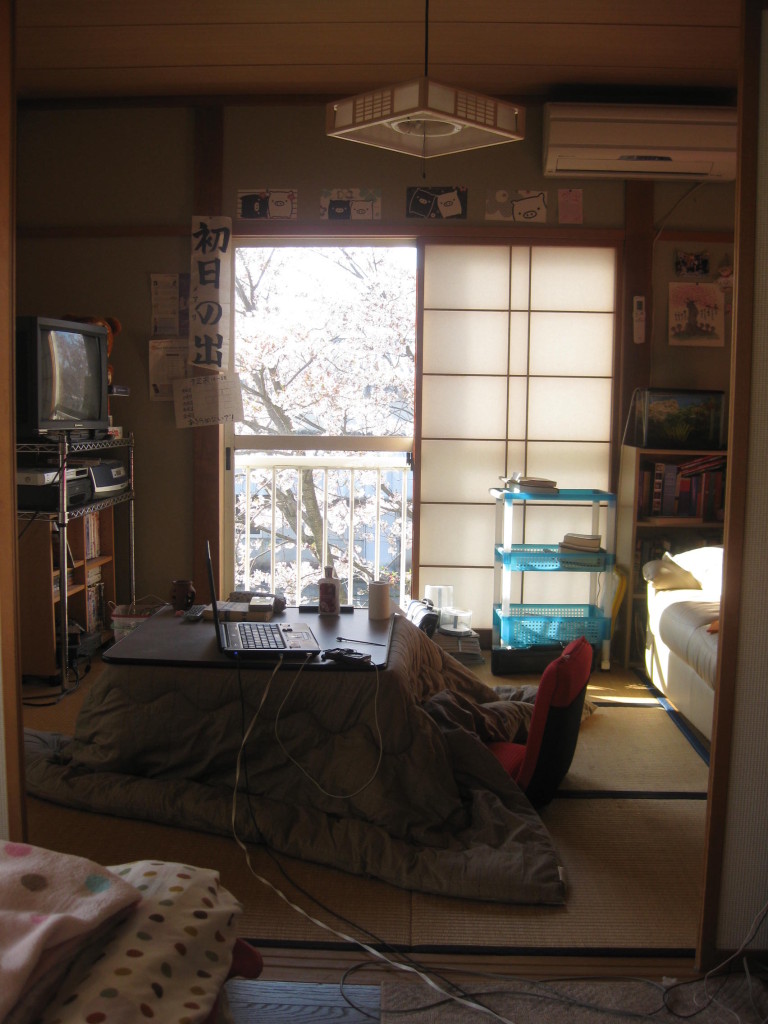
While housing in Tokyo tends to be more on the cramped side, apartments are still clean, well-equipped, new, and most of all safe. Usually these units include a tiny kitchen, a bathroom with tub and shower and a room that acts as your living room and bedroom (so basically, it’s a studio).
In the downtown area of Tokyo (such as in the Ueno train station area), a studio/apartment of this caliber will cost about 800 USD/month.
In Los Angeles, finding an clean studio in a safe neighborhood that is just as centrally located as Ueno will set you back at least 1500 USD/month.
Monthly Tokyo Housing Costs: 800 USD
Monthly LA Housing Costs: 1500 USD
Transportation
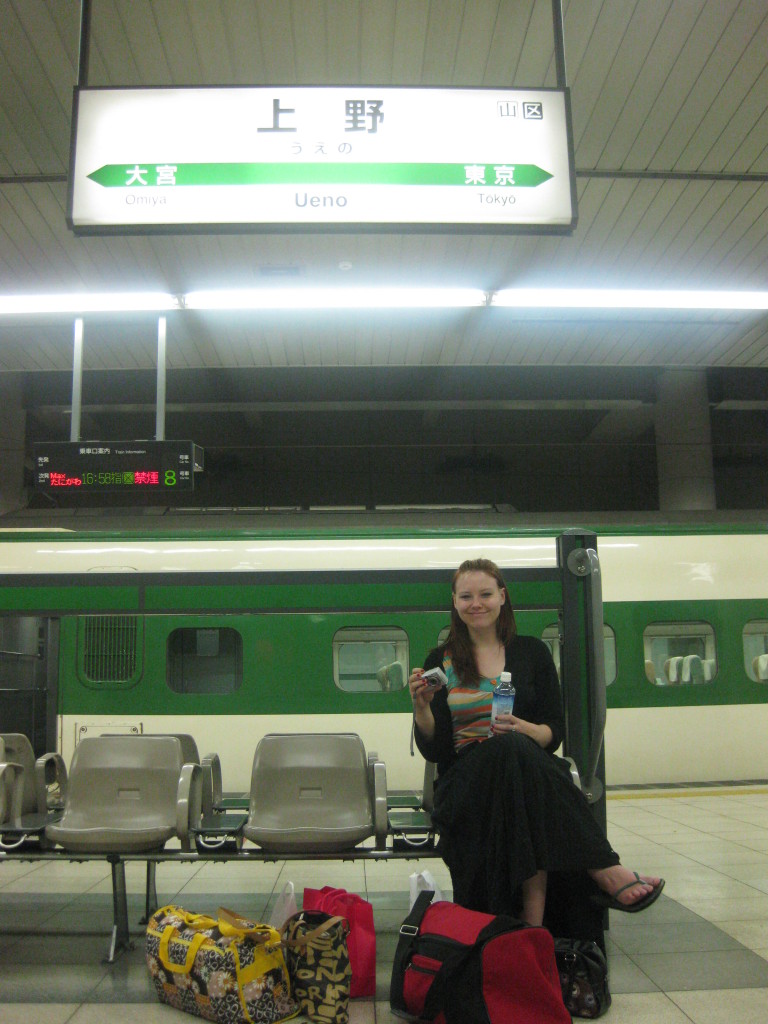
Tokyo is blessed with the world’s best railway and subway network. You can literally go anywhere in Tokyo with the train and subway alone. Plus, the trains come frequently—and when I mean frequently, I mean every two minutes. Trains are clean, orderly, and most of all punctual.
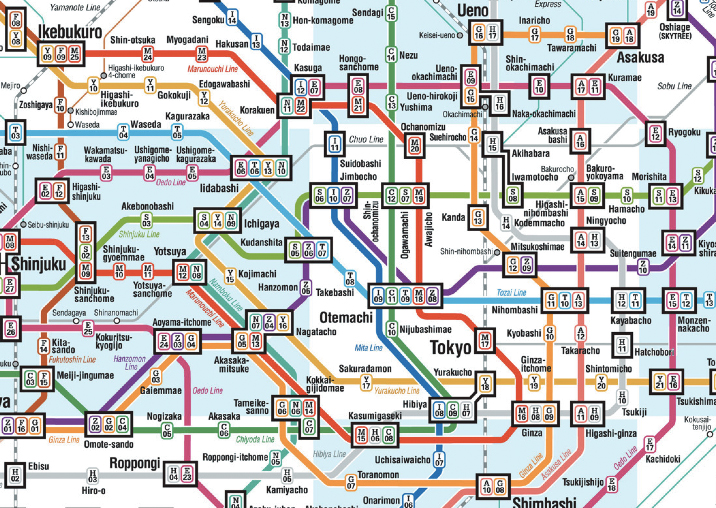
Based on the assumption that you live in Ueno and commute to Shinagawa (a major business area near Tokyo station) your round trip ticket commute would amount to 8 USD/day (and about 30 minutes one way).
In Los Angeles, you could live without a car—but your life would be absolutely miserable. So for simplicity’s sake, let’s assume you cave in and get a car to move around because, really, living in Los Angeles without a car is near impossible.
Let’s assume you lease a car (which I did) and your monthly payment is 200 USD/month (no down payment) with car insurance at 100 USD/month (which is a deal for Los Angeles). Throw in gas and that’s another 100 USD/month.
Total? You’re paying 400 USD/month for a car. I know this seems like an optional expense—but trust me, living in Los Angeles without a car is a major handicap (plus, the average commute time in Los Angeles by car is 40 minutes—one way!)
Public transportation in LA is also not cheap. I actually take the train to work and it costs me 350 USD/month. No, you did not read that wrong. The train ticket is more expensive than my total car payment.
Monthly Tokyo Transport Cost: 160 USD/month in train tickets
Monthly Los Angeles Transport Cost: 400 USD/month in car payment/insurance/gas OR 350 USD/month for train/public transit
Food & Restaurants

Meat and fruit in Japan tend to be slightly more expensive than the United States (it’s an island nation, it’s hard to mass produce livestock and agriculture due to the terrain). In exchange, fish and seafood are much cheaper than the prices at your typical grocery store in LA. Vegetable prices in both countries are comparable. Depending on the types of meals you cook food expenses can vary, but for the most part Tokyo and Los Angeles are equal in food prices.

In the worst-case scenario where you don’t cook at all, 7-11 in Japan sells bento boxes for about 500 yen (5 dollars) per meal. Even if you ate at 7-11 for every meal seven times a week, your food expense would still come out to about 105 USD/week.

Restaurants prices in Japan are comparable to the USA, with an outing at a slightly nice establishment costing about 15 USD per person. However, there is one huge difference between Tokyo and LA: no tipping for Tokyo. Although tipping may seem like a small after thought, it’s actually an extra 20% in cost for Americans that dine out. Plus, service in America just plain sucks compared to Japan.

In Tokyo, I think one would be quite cozy spending 500 USD/month on food & restaurants.
Since food prices in America are comparable, I’ll budget the same price for the states—with an extra 50 dollars for tip.
Monthly Food Costs in Japan: 500 USD
Monthly Food Costs in America: 550 USD
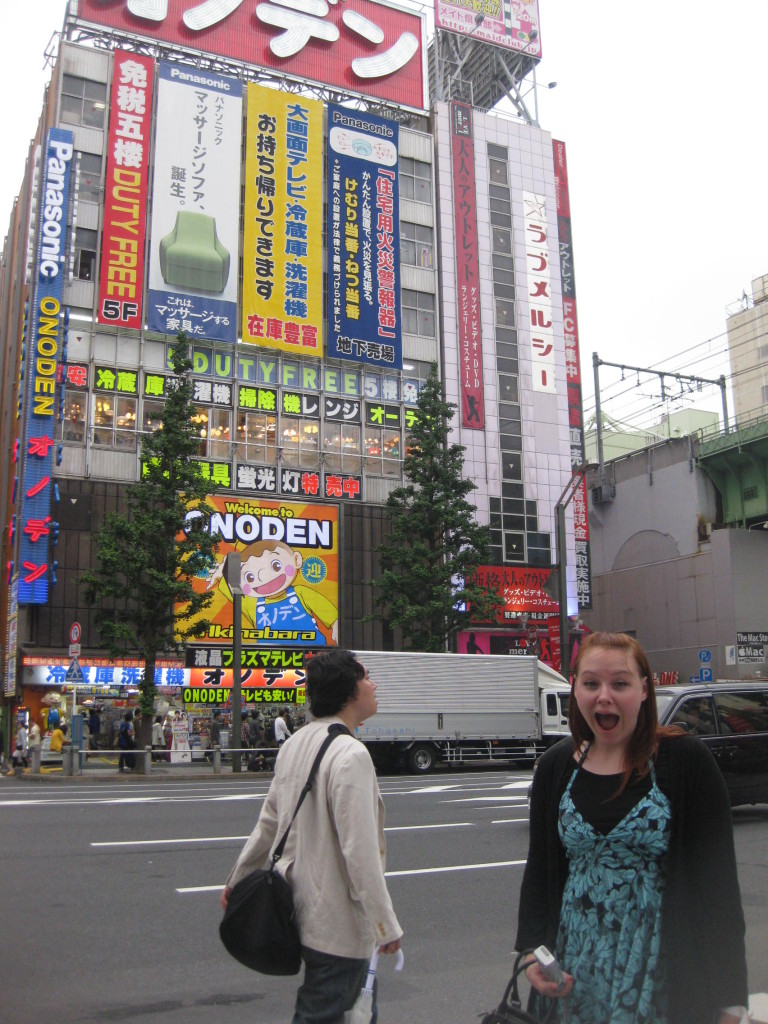
The Grand Total
Monthly Cost of Living in Tokyo: 1460 USD/month
Annual Cost of Living in Tokyo: 17,520 USD
Monthly Cost of Living in Los Angeles: 2450 USD/month
Annual Cost of Living in Los Angeles: 29,400 USD
And the grand total for savings are…
Tokyo Savings:
30,000 USD annual salary – 17,520 USD cost of living = 12,480 USD Savings
Los Angeles Savings:
35,000 USD annual salary – 29,400 USD cost of living = 5,600 USD
Living in Tokyo will allow you to save an extra 6,800 more a year compared to life in Los Angeles.

Even if you were to blow an extra 2,000 USD on shopping, travel, etc.. in Japan on a yearly basis, you would still save more than double what you could in Los Angeles.
Can you imagine what you could do with over 12,000 dollars in savings? You could pay off a huge chunk of your student loans, invest, take a long vacation, or even get that masters degree you were pining after.
While Tokyo is infamous for being an expensive city, the great public transportation and low cost of rent make it much more affordable than costly Los Angeles.
And living in Japan for a year is more than just a great way to save money—it’s an amazing chance to take a year off from the grind of life in the USA and experience another culture.
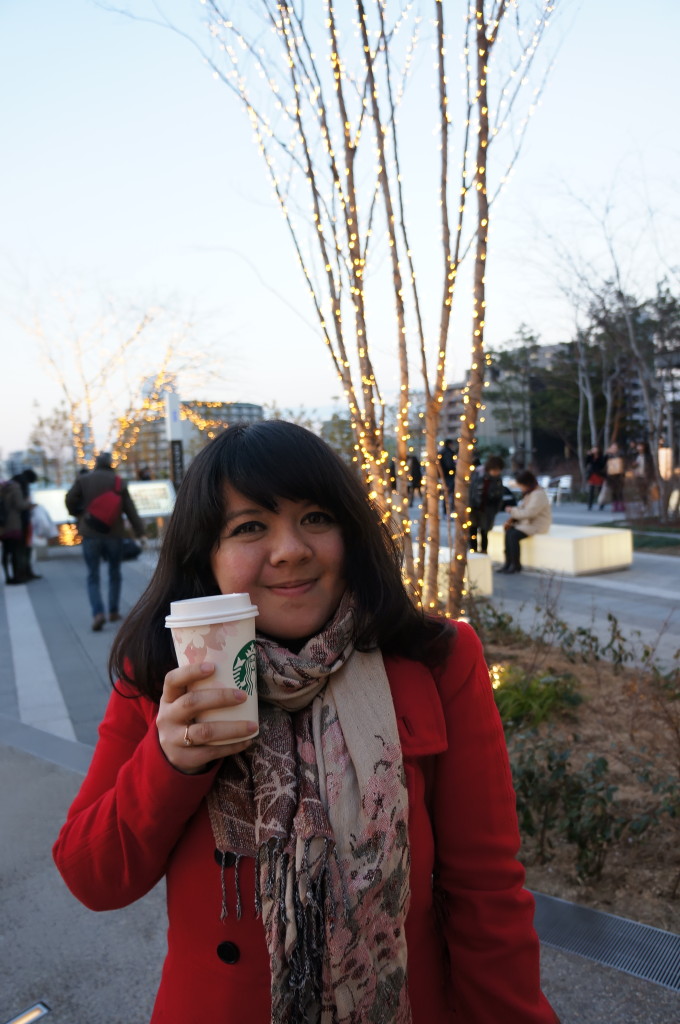
Have you found that you can save far more money living abroad than in your own country? What do you think about cost of living abroad?
*Note on taxes: I did not account for taxes and healthcare in the above scenario. Taxes in Japan are actually quite affordable and are only slightly more money than what Los Angelites have to pay in California taxes.
*Note on health insurance: Healthcare is also cheaper in Japan, since the government (or company) is required to cover 70% of everyone’s healthcare cost. In the United States, many live without health insurance due to exorbitant healthcare prices. Even with Obamacare, I pay 250 USD/month for a plan that does not cover dental or vision. Healthcare in Japan is also ranked much higher than the United States, so you’ll not only be saving money—but you’ll get better care.

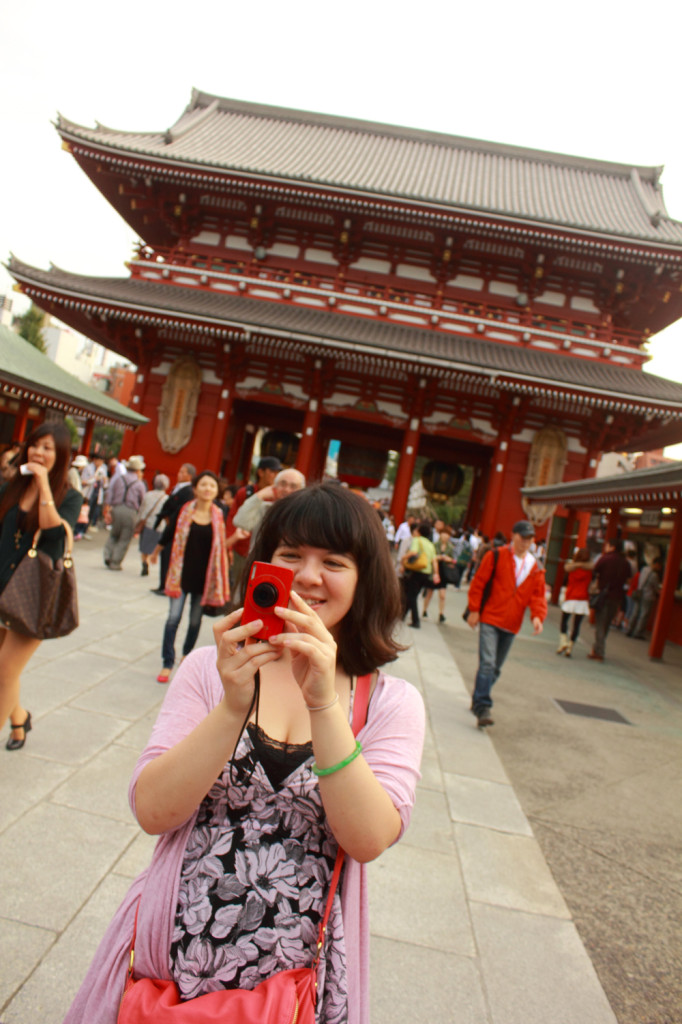
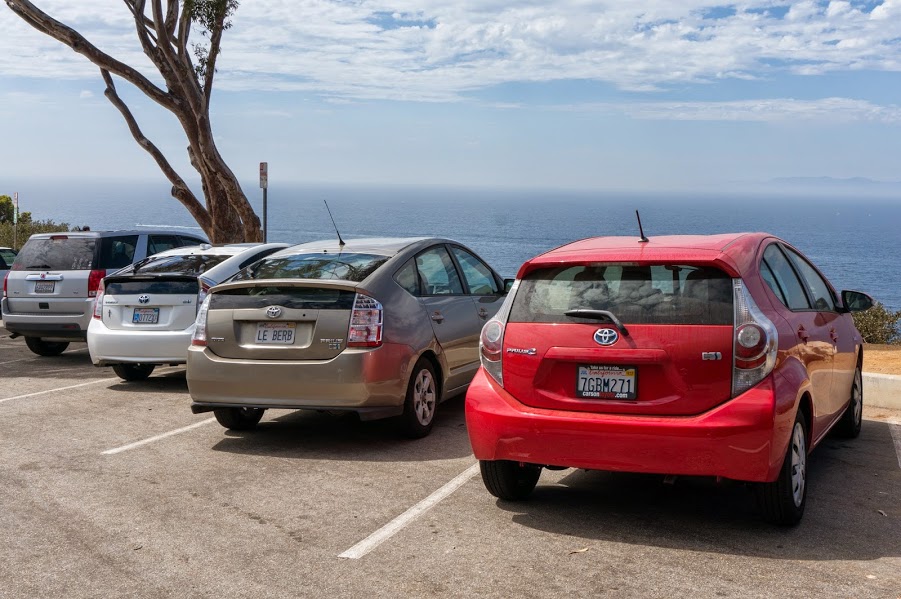

57 thoughts on “Save Over $10,000 a Year By Living in Tokyo”
following post: HOW TO SPEND 10000 US DOLLARS IN ONE WEEK IN SHANGHAI
ahaha
I know: TAKE SIMONA SHOPPING WITH YOUR CREDIT CARD! More like 10,000 dollars in two hours, haha
Interesting! Not to mention that if you are in Japan as a teacher, your first stop is much more likely to be somewhere in the stix like Takamasu or Nou. Where everything is much cheaper than Tokyo.
Oh, Nou!
I know, Tokyo is definitely the extreme! How much is rent in Takamatsu? My apartment in Nou was only 500 bucks a month. Plus, when you live in the boonies, there are far less temptations to spend your hard earned money on, unlike Tokyo which is full of shopping and cafes etc..
The problem with the USA is rent is going up like crazy, but salaries aren’t. At least in Japan rent and housing is affordable–and not having a car is a huge plus!
Interesting! I didn’t know living in the US was so expensive.
I should also compare the costs of living in Spain vs living in China. I think it would be more or less the same! China is getting very expensive 😀
China definitely is not cheap! Many of my friends assumed I saved a lot of money in China–because, well, it’s China–but actually, eating out in China is about the same cost as the USA! I’d say living in Shanghai is about the same cost as Tokyo above, with slightly cheaper transportation. I definitely want to do a Shanghai vs. America one next!
I am super curious about Spain, though. Americans always imagine that Europe is far more expensive than the USA, but my German friend told me a flat in Berlin was about 500-600 usd/month. I was blown away! I’d love to hear about Spain!
I’ve heard Berlin is one of the cheapest capitals in Europe, there are a lot of young and “hippy” people there. But try London or Paris… rents there are crazy! In Spain it depends on the city, of course. My brother lives in Madrid and there’s no way you can find a decent room in a shared flat for less than 500 EUR I think. So imagine renting a whole apartment! But smaller cities are of course more affordable. In fact I think in my hometown you could rent a 4 bedroom apartment for around 400 EUR a month. I haven’t been in Spain in quite some time though so don’t trust me 100% haha. Eating out is definitely more expensive than in Shanghai (well unless you are thinking about those fancy and expensive western restaurants :P) so people there don’t eat out that much, once a week maybe.
I keep reading all these articles about Berlin being hip and cool, too, haha (everyone says Barcelona is also the place to be, btw!). Wow 400 EUR/month! That’s awesome!!! I still think 500 EUR to share a flat isn’t so bad… my co-worker here pays about 1000 EUR/month to share a flat here in LA, and she still has a 40 minute commute everyday! It’s nuts. Where in Spain are you from btw?
Haha yeah the noodle and congee shops in China are dirt cheap (like 3-4 bucks!), but going to an actual Chinese restaurant is getting more and more expensive (except for Waipojia, haha, love that place…). Anyway, the western restaurants are super expensive but still cheaper than the USA, and the quality is about the same IMO 😉
Ooooh I love waipojia!!! Their chicken is delicious!!
I think 500 eur for a room is very expensive considering that salaries in Spain are a joke… My brother was earning 800 eur a month! (He is an engineer with a masters degree in renewable energies…).
I am from a town in the west of Spain called Caceres. Population 90,000 😀
Damn, that’s quite a difference between the two cities! Most people would assume it costs more to live in Tokyo — but you’ve clearly demonstrated that’s not true!
I wonder how much you’d save living in Shanghai? I know I’m saving a heck of a lot of money just by living here in Hangzhou, but I’ve never done the math. I probably should!
Whenever I told people that I lived in Japan they scrunched their faces and told me that it was too expensive to live there–but little do they know their high housing costs and car payments actually make life in America more costly!
I saved a lot in Shanghai–but I also spent a lot (ha!). There is a lot of temptation in Shanghai for going out, trying new restaurants, seeing different events traveling–it was hard for me to exercise restraint. Still, I was able to save a good chunk of money while in Shanghai. I didn’t realize how affordable China was until I moved back home: Just to survive in America, it costs SO much money! (I really wish I could do away with the car, ugh!)
I would love to hear about Hangzhou, especially to see how it compares with Shanghai! I wonder if it’s much cheaper?
“but little do they know their high housing costs and car payments actually make life in America more costly!”
Sooo true,
When I read the title, I was skeptical, but you make a good argument! Prices really do add up in the US, especially if you live in a city. I agree that in L.A. (and most places) a car is pretty much a necessity. I’m from Milwaukee, which is fairly large, and it would be impossible for most people to not use a car to commute unless they lived walking distance from work.
I am able to save a lot of money in China because the cost of living is still pretty low. However, for some stuff–quality food, entertainment (like taking the kids swimming or to an amusement park), owning a car–is cheaper in the US.
Yeah it really depends on your situation. If you have a family and are thinking about your future, maybe living abroad may not be so practical since things like cars and entertainment (like you mentioned) tend to cost more, and they are a necessary convenience for having a family.
Actually, I moved back to the USA from China because I assumed salaries would be higher here. Surprisingly, my salary in LA is the same as my one in China (probably a little bit less because of health insurance), yet cost of living here goes above and beyond what our day job can support (paying for a car, health insurance, gas, etc.. it all adds up). I actually looked for work in other states (such as Idaho and Utah) to cut my costs, but the salary offered there was only dollars above what I made as a part-timer in uni almost 6 years ago (some jobs only paid 12-14/hour, and still required a bachelors degree). It’s insane to think about paying for rent and a car when you make 12/hour.
Anyway, there’s win and lose with both scenarios but I think if you want to take a life break AND save money, you can do it living abroad–even in a country that is ‘expensive’ like Japan!
I’m from Milwaukee as well and lived in Japan (albeit in Nagoya, a city that’s even cheaper to live in than Tokyo) but Mary’s points are spot on. I didn’t believe it when first moving back to the States, but now (and even more so with the yen compared to the dollar) it is quite true.
It is easier to save money in Tokyo than it is in Los Angeles if you live a similar lifestyle.
Here’s one extra point on the graph: In the case of health insurance, I was told by my accountant that you can write off any health insurance premiums paid on the first page of the 1040 form as a pre-tax deduction if you pay everything on your own without help from an employer. That was also the case in Japan with 国民健康保険 (one of Japan’s single-payer insurance systems) payments, so that would help lessen the blow somewhat.
In my case, I work as a freelance translator and interpreter and own my car, so that saves me quite a bit on transportation costs. Like Mary, I have considered moving to a place with a cheaper cost of living, and with my translation work location really doesn’t matter at all.
That being said, I am single, make enough to get by and save a little each month as well. I love the climate here, and the other job/social/other opportunities (rare as the job opportunities may be at times) are good enough to keep me here for now.
Paul! Thanks for the comment!
I actually did the write off with health insurance for my taxes, but I’m still paying a ton of money back to the government (and like you, I have to file a 1099 because my Japanese company is evil).
Luckily I don’t have to pay rent (in exchange I get a horrible commute), but it has helped me pocket a lot of money. I agree that weather in California is nice, but the traffic and distances I drive is simply not worth it to me (but everyone is different, my aunt would rather die than live in a cold climate, while I really don’t mind having seasons at all). Different folks different strokes!
And honestly, it is hard to save money in Tokyo due to all of the temptation of restaurants, museums, events, etc.. (the beer and ice cream from random conbini stops add up, I’m sure!). If you have cast iron willpower, however, you can definitely save in Tokyo.
Thanks again Paul! Hope to see you in LA again soon.
This is so true! I live in Los Angeles. It’s darn near impossible to survive without a car in LA, car insurance is astronomical, and so many idiots text while driving that being rear-ended is inevitable. I miss the metro systems in NYC, Boston, and DC. LA has none of that. And health insurance — good grief. It’s one of the reasons to consider moving to Tokyo. Or England. Or Canada.
Though I would miss the abundance of citrous trees. Angelenos give away oranges and grapefruit the way folks on the East Coast try and pawn their summer zucchini off on their neighbors.
I wondered about the metro system in DC, is it pretty good? And is DC really that scary or is it all just hype?
Anyway yeah I just drove to work today and I can tell you my blood pressure is higher than it ever was before I came to California. Beemers weaving through traffic, a-holes cutting you off, no one letting you into a lane… it’s enough to make me say ‘screw everything’ and just off road into the distance.
I have yet to receive free oranges and grapefruits! I do admit, though, the clementines and oranges here are pretty darn good.
I’m so glad to meet a fellow Los Angeles dweller on here that can share my pain. You have no idea. Your blog cracks me up too–you’re hilarious!
BMW drivers!! They are the worst.
But the rest of the people here are super progressive. We take no flak for being interracial — what about you?
Japan is definitely known for being an expensive place which is why I haven’t gone yet. However, I do realize this is a great time to go with the value of the yen dropping. Really great cost comparison. Will tweet. Thanks!
Thanks so much for the tweet Lani!
Compared to Thailand (and Vietnam, Cambodia, etc..) life in Japan IS quite expensive. When compared to the USA, though, I actually think Japan is the more affordable.
I need to post some tips about cheap travel to Japan, because there are so many good deals to get there from Asia (especially with the Japanese yen so low, it’s ideal!). I really hope you can at least visit there, it’s a truly wonderful country.
Me, too! xxoo
BTW I would love to see how much you save by living in Thailand! Or, at least, see how much it actually costs to live in Thailand (since I imagine it’s quite a good deal!)
Oh, I’m not very good at those things, I fear. But I’ll think about it. So much depends on how you want to live, your comforts and such. City vs country, as well. It’s a popular place for retirees b/c it’s so cheap.
This post is dead on about the States. Dawen and I are saving money in Shanghai just so we will go back. Haha! I honestly don’t know how I feel about it, though. We both have health insurance in Taiwan. My husband is not qualified to have insurance in China because he is not a Chinese National which is okay because we’re liking our health insurance. It does make a difference because the health insurance in the States is insane. I’ve heard it has gotten better, though?
My husband speaks Japanese without accent because he studied when he was just a little kid. He spoke at the airport in Japan and he was mistaken as Japanese. xD I think we should at least visit.
Health insurance in the states isn’t better… I thought it was with Obamacare, but it’s actually quite high (I pay 250/month for very basic coverage which, in my opinion, is NOT affordable). It’s also such a pain to go to the doctor here, I don’t know about Taiwan but in China and Japan you just walk into the hospital and get treated right then and there (here, it’s 2-3 week wait and it’s horrific to find a doctor that will even take you, especially when you have Obamacare). Also, due to a recent lawsuit, Obamacare coverage might be gone in many states (depends on the outcome)–it’s really crazy over here with healthcare now. Unless your company gives you benefits, you’re screwed (basically).
That is SO cool your husband speaks fluent Japanese!!! I remember going to Taiwan and being amazed at how many people were not only fluent in Japanese, but very up-to-date with Japanese culture. It was super nice 😀 I hope you and Dawen have a chance to visit Japan someday!
I’d like to think I helped inspire this post? Maybe not but it was great to read and see the difference in costs. I too didn’t think one could save money in Japan because I thought it was expensive. I’m happy to know that it is possible (and quite a lot!)
Thanks for doing the math!
I m a softer engg in India having 3 yrs of experience and monthly net takeaway salary is ₹43k .Recently got offer from Japanese company who is offering me CTC 3,75,000yen(including commute upto 20,000 yen)my job location is Shinagawa-ku, Tokyo.
Anybody pls suggest how much I can save from my monthly salary ?
Also how much expenses would it be ?
Any cheap place to stay from where I can do travel to office easily?
Any help would be appreciated.
Your math is so far off it’s not even funny. First of all, I’m from LA. If you just moved to LA, your rent would be sky-high, but if you’re a lifer like I was until recently, you would be under rent control and would have WAAAAAY under average rent costs. Secondly, you could live somewhere else in the United States and cut your rent down dramatically. Third, I eat grass fed beef several days a week and still keep my food costs under $300 per month. There’s Costco, Trader Joe’s, and other cheap supermarkets you know. Finally, why would anyone have payments on a car? Buy a used car, cash. Your monthly payment? Zero.
This post is misleading, but I did find another post of yours informative.
Pedro, I’m not going to flat out say you’re wrong, but I just want to ask you: Have you ever lived in Tokyo? Because I’ve lived in both Tokyo and LA so I feel like I have a better grasp of the cost involved with both places.
1. To live in rent control means you need to make under a certain salary, so you have to be pretty damn poor to qualify for rent control housing. Plus, these units are limited and there is no guarantee that you can move into rent control housing, which means you might get stuck paying “regular” cost of rent. Whereas in Tokyo, “regular” cost of rent is the cost of rent control housing in LA.
2. Yes, you could move somewhere else and cut costs. For example, Boise, Idaho. If you moved from L.A. to Boise, would your costs go down? Hell yeah it would. Would you have the same access to shows, bars, diversity, events and other fun offerings a large metropolitan city can offer? No, you won’t (Boise is not as happenin as L.A. and I don’t think I need to convince you of that). So I’m saying if you want to cut costs and live in a vibrant, metropolitan environment for half the cost, then moving to Tokyo is definitely a more affordable option. As I mention at the end of my post, however, I do know that this is not for EVERYONE. Few people would move to Tokyo just to save on costs, since they would have to deal with drawbacks such as language barrier, etc.. I encourage people to do it for 1. short term savings and 2. experience life abroad.
3. I’m glad you eat grass-fed beef and are somehow able to keep under $300/month. What a diet.
I won’t argue that Costco and Trader Joes are cheaper. But guess what? TOKYO HAS COSTCO. And I argue in my post that Japanese food costs are the same as the U.S.. This is true. But with the different in rent and transportation costs you save a shit ton more of money in Tokyo. You could eat at a michelin star restaurant in Tokyo and still save more money than L.A. because of all the rent/car money you have in savings.
4. The car. This is where your argument is most flawed. Yeah, buying a used car (that is in good condition and won’t break down all the time) is an awesome option, and something I wanted to do, but guess what? You need to pay for a used car up front. This can be 5k, 10k, even 15k. Let me ask you Pedro, do you have 10k in cash you could hand to the dealer to get a used car right this minute? If you do, then you obviously shouldn’t be reading this post because you’re more financially well off than most millennials (most millennials don’t even have 1k in their bank account). You may argue with me and say you can get a loan from the bank to pay for the used car–but guess what again? YOU’LL END UP WITH A MONTHLY PAYMENT. And you’re still forgetting auto insurance, in which California is the most expensive in the country (easily another $100 month).
Or, you could live in Tokyo, have no need to pay 5-10k up front or take out a loan from the bank, and just ride a 2 dollar train across the city. What do you think is more difficult? Moving to LA and buying a car for 10-20k just to get around, to even go to the grocery store? Or moving to Tokyo and having all-access transportation through the best railway network in the world for 2 bucks, no questions asked?
Pedro, I suggest YOU try to leave Los Angeles and go to another city and then tell me how much money LA has saved you. I had many friends who moved to NYC (notorious for being more money than LA) and said that cost was equal to LA because they didn’t have to drive a car there.
Try opening up your mind and traveling to different places before commenting on my blog. Thanks.
And finally, just because I want to say it: Los Angeles is a god awful city. Traffic, crime, spread out, expensive, parking problems.. my god it’s just such a horrible place to live. I’m 100x happier in San Diego.
Ive never heard of rent control, is that like section 8? I was checking out real estate and section 8 seems like a dang good deal, you can rent for free if you qualify I guess
Ive never seen that in Japan, but they do have public assistance housing
As for the train vs the car commute; Ill take the car because the japanese train is all good until you hit the 5 am to 9 am and 6 pm to 10 pm, then if your lucky to get a seat, nobody will sit next to you, usually some drama kicks off about 9 pm and/or there is the weekly suicide that stops the train, no fun in August weather. At least in your car your alone and can jam your tunes etc. I guess a motor bike is a way around allot of that, or ride the bus.
I don’t know what’s worse: being in a sardine can rush hour train in Tokyo pressed up against nasty, sweaty salarymen or suffering through hours of traffic in your car as you go to and from work. As the old saying goes: your commute determines your happiness. Just move to the countryside and start an organic farm and viola, problem solved! aha.
.”Recently got offer from Japanese company who is offering me CTC 3,75,000yen(including commute upto 20,000 yen)my job location is Shinagawa-ku, Tokyo.”
You can save huge with that amount. get a costco membership for 5000 yen, then for 1 year you can stock up on all your meals. recently costco japan seems to have more japanese products in it than U.S. to me anyway, but there is still lots of value there. You can get good deals on yahoo shop japan too, like a case of beer for 1000 yen. Many company cafeterias and company hotel cafes have dinner etc for almost free. Beware of resellers or flea markets, it seems allot of the people Ive seen at flea markets are just resellers anyhow. Resellers in Japan are just a hustle, get all your stuff wholesale or free. When they see gaijin they see sucka, so I avoid that.
you can get all furniture, appliances for free off craigs or tokyofreerecycle etc. Sell it when you leave. Look out for when people are moving, and ask them if they have anything they want to dump, you can get really nice stuff for free.
if you live near your work you can bike, but its dangerous, and if your kaisha pays your kotsuhi then your good anyhow
You can room share and cut your rental fee in half, or just find a cheap apartment but since your a gaijin, expect some fun and games with that, but your company might do it for you. Another thing about Japan, everybody tries to be the “sensei” or word of god, like what they say is the only way. Dont believe it, there are ways around most anything. Japan is expensive if you live like Japanese do, otherwise its quite cheap. If you think like a Japanese youll be defeated, so only do it when its required of you, but turning it on and off can get to you long term. Also, Japan is an inside game, has been since ancient times, meaning you can get access to allot of things if you know somebody, like great food from Hokaido or tea from another prefecture.
” Just move to the countryside and start an organic farm and viola, problem solved! aha.”
Or move to a state where you can have the organic farm (a dream of mine) and commute to the metro. LA doesnt really fit into either of those parameters. Youd have to move way out to Joshua Tree Palm Springs etc to really get away from it, and by the time you get out there, its too far to commute and you cant grow anything as there is no water.
Also (sorry I forgot to add) Japan is cheap on many levels because of deflation, which is what the old, and mostly xenophobic, demographic, wants to keep because they are on pensions. Collusion and collaborations at the corporate level runs deep to keep out foreign competition, but everybody has a job in this very controlled system because made in Japan is seen as patriotic and all other products inferior. But made in Japan requires tedious attention to detal, and dMost people are working in the service industry, like folding a towel the same perfect way, or making a pastry the same way, day after day. This is how Japan works, kind of opposite to what you find in the U.S. where the most practical, least labor intensive and cost efficient patent is selected, whereas in Japan everything is overengineered for the domestic market. Some in the gov want to change that up, because you can have deflation forever because nobody will spend and the economy wont grow and the debt just gets bigger.
Dang I’m taking a Japanese Business and Management course and you basically described half the chapter I was reading in one comment. Good job!
This also puts a halt to innovation. The pressure to adhere to extremely strict procedure is a total killer in terms of creativity.
“This also puts a halt to innovation. The pressure to adhere to extremely strict procedure is a total killer in terms of creativity”
!00%, thats real talk, Japanese do innovate, (washlet toliet?) but dont invent much of anything that would be known as game changing technology. Innovation for them is to wait on another country to spend the millions on R&D and risk, then pick up where they left off, some will later claim it as their own. Id hardly call that being original, but they have the amazing ability to look at something then change it and make it “Japanese”. You make a good point about pressure to adhere, but Ive never really understood why, or understood why the Japanese business model works at all, maybe the lifetime employment system, unpaid overtime (servitude) and cross stock sharing makes it all go around. at any rate, its one miserable system to be a part of!
Ive heard (please dont quote me) that the US gov tried to put tariffs on their stuff like they do to US products, but the Japanese out smarted them by just moving their factories to the US, now the products are made in the US (tariffs no longer needed) and they get a sweet deal from the governers like a 15 year tax free subsidy. I guess they still must pay the 40% or whatever it is corp. tax, but Im quite certain they must be getting some sweet deals or they wouldnt be there. So maybe they just exported their business model overseas and its working good for them. Domestically, their economy seems to be in a perpetual rut.
Your information about the expenses in LA – especially health care and Obamacare was truly illuminating. I did not know that health care was so expensive in USA.
India (my home country that I left some time ago) sounds much nicer – we do not NEED healthcare insurance. When we feel sick, we just go to the best suited doctor in the neighbourhood (there are always at least 5 doctors with clinics of whom 2 would have returned from the US after studying / working there). They usually charge around 5 USD per visit, medicines cost another 5 USD or lesser (most doctors do not prescribe unnecessary medicines). So the savings back home are much higher 9at least half the salary is saved)
It is similar here in China for me. If I fall sick (just the normal stuff – common colds and flu), I just have more fruits and rest. Has worked well for me.
I guess at first glance we do not see the real costs of living in a certain country. In London (where I lived prior to this), I could barely save 100 pounds per month – after scrounging by not using the public transport as much as possible (it is extremely expensive), never eating out / having coffee outside, and staying in an accommodation a tad smaller than my house helper’s back in India! Ironically, some of my Scandinavian students stayed in better houses! What is most appalling is that it is no different for most British people.
I was lucky not to fall sick in the UK. The NHS centers near my house needed advance bookings for a week and stayed closed on weekends. Sadly fevers do not always make an advance booking!
My fiancee worked in India as a doctor and he said while the facilities/infrastructure aren’t as nice as the US, the hospitals in India are affordable for everyone and do basic healthcare pretty well.
China is probably comparable to India. Although the facilities really shocked me at Chinese hospitals, I was happy I could just walk into the doctor’s office, grab medicine and be on my way. In the US you have to make an appointment weeks out, or if you go to urgent care you most likely have to wait 1-3 hours for a doctor to see you. Not fun.
Your insights on London are CRAZY! I can’t believe how expensive London has become… sounds like San Francisco!
I read through this post again, and had me thinking, if you live outside of Tokyo a car is a necessity because the train only runs maybe 3 times an hour. For a car in Japan you need shakken, every 3 years which, like the apartment thank you money, reikin, is IMO a kind of scam. there is also mandatory kuruma hokken and gas. Gas is expensive in Japan (sold by the liter), as is motor oil. An altenator replacement in Japan can cost min. 30000 yen, before labor, and thats a very low end estimate, acutal is more like 40,000 yen, or more. A bicycle tire is 3000 yen. To replace, for ex. a bicycle crank at a bike shop can cost you as much as 6000 yen, whereas you can get the same tool on ebay for 300 yen and DIY. Japan is set up like this, so you depend on an “expert”, whereas the US is a DIY culture. As far as I know, there is no shakken or thank you money for rent in the US. You can get parts on ebay etc or just do a walkin to a junkyard. Change a bicycle tire, respoke or change your bike crank bearings? DIY. There are bike shops every few kilomters in Tokyo (on one 20 kilometer bike trip I counted 12) because many Japanese wont even risk changing a bike tire themselves. Junkyards in Japan dont usually deal with walk in customers. You never see older model cars in Japan, like you do in the US, because they wont pass the shakken inspection, and it gets more exensive to keep them. Then you must pay for parking. parking in some parts of tokyo is over 20000 yen. I never paid for parking at any residence in the US. Then if you visit some stores, there is also a parking fee, but can be waived depending on ho much you purchased. for any travel on what Japan considers to be their interstate highays, the tomei roads, you must pay tolls throughout the trip. So I must agree with pedro, long term its cheaper to own a car in the US vs Japan. As Ive already probably offended many readers (sorry I cant lie about the fees and cost I have paid), I wont even get started on hospital horror stories.
I will agree with you that owning a car in the US is cheaper than Japan. Hell, owning a car in the US is probably cheaper than anywhere else in the world (especially since gas prices are so low here).
But I just have to refute you because I lived in no-man’s-land-middle-of-nowhere-Niigata for 2 years and I didn’t need a car. I got around just fine. Sure, the train only came three times a day and the bus 1-2 times every hour, but with some planning and a little walking/biking it was totally doable to not have a car. The point is: I didn’t have to *rely* on a car. It was not an absolute necessity of my life.
So when you say the train “only runs” three times in Saitama, it just goes to show you haven’t taken public transit in the US for a while. In LA the subway and high speed trains only run three times an hour… during rush hour. And really, it’s a miracle LA even has a subway or high speed train system at all.
I would say in almost every city in Japan, you could live without a car. Sure, living in semi-rural Saitama isn’t as convenient as Tokyo, but you can get around. You don’t need a car to go to the store, to the doctor, to the post office, bank, movie theater… most importantly, work.
In the US? Oh my god. You can’t go ANYWHERE without a car. How would you get to work without a car? How would you get anywhere? I guess nowadays you could take an uber but that would add up pretty fast.
Aside from Boston, NYC, DC SF (ish) and Seattle (ish) I don’t think there are any cities in the US where you could feasibly live on public transportation alone. Compare that to my small town in rural Niigata.
I HATE having a car–but if I got rid of it, I would literally have no way of getting anywhere. And I’m especially sore about this tonight because I just found out I got a flat tire…. again. For the third time this year. And I am a very careful driver. I pay up the wazoo for insurance in California, my monthly car payment sucks and then I get stuck paying $$$$ to fix my car because people throw sht in the road.
I guess my point is: if I were in Japan, I *most likely* have the option of taking a bus or train or something if my car breaks down. In the US, I’m just fcked. I have no way of getting around except begging friends/family to give me a ride until my car is fixed. Think about a poor person making 12/hr and their car breaks down, it costs 800 bucks to fix, they have no way of getting to work the next day and on top of that their rent is 1200/month (cause rents here are outrageous)… Ugh. I’m just not a happy camper in the USA right now.
The original point of this post was: if you want to live on the cheap in Japan, you can. If you live in rural Saitama, you might have to get up an hour earlier to catch an inconvenient train time, but at least you can get from point A to B without paying for a giant death machine (aka, car).
“I *most likely* have the option of taking a bus or train or something if my car breaks down. In the US, I’m just fcked”
ell that seems like a very defeatist attitude, but its kind of interesting because I can feel the frustration in you post (Ugh. I’m just not a happy camper in the USA right now), but when I vent my frustration about Japan many go bizerk….LOL ) But I wont do that to you. Can I polietly ask, where is your American DIY spirit? I see you were raised in Utah so I know those guys got it (met plenty of mormons in Japan) A workaround would be to get 2 cars, an ebike, motor bike etc so if one is down you can use the other. we always had at least 3 cars/trucks hen I was growing up. 800 USD for car repair? some mechanic is making good money, but he wont be getting my 800 $. You can get altenator diode packs on ebay, carbs, manuals etc. if it needs a ring job, timing belt or something then you bought some junk, lesson learned. I got took by some snake in Japan once, never again, bought a kei van that as 2 man yen, but rings were shot, my mistake, he sa desperate gaijin coming. As I posted before, your local community college has great classes on this stuff, actually I learned most of it in high school and the military. with youtube now you can do almost all your own repairs. Id get me 2 cars, drive one, and tear the other one down to the ground and rebuild it. Id trade all that adventure with you anyday for the horrible life that many Japanese live. Cant even use a drill motor on your balcony in Japan without getting a warning from the oyaji neighborhood nazis about noise control. But I get it, for some women, the train is very convenient, so is the bus in Japan.
I as thinking it over some more, and I agree/disagree with you and I should of summarized it better in the above post Rent and cars are very expensive in Japan because of the scams known as reikin, koushinryo, atamakin and shakin. Reikin is thank you money to the landlord to allow you to use his property. Then there is atamakin (2 months rent), and then the very interesting fee known as koushinryo, (continuation fee, aka scam) which much be renewed every 2 years and its approx. 1 months of rent. Some “foriegner friendly” cities like Kawasaki are waiving these fees, but this is not the norm. Also, many agents still will not rent to a forienger, and this is not seen as discrimination at all in Japan. No in Nigata I dont think they do this, but in Kanto area, most definetly do. So, while monthly rents may appear to be initially cheaper than the US, in the long run they are not. The property in Japan is mostly old small cramped rooms. I lived in a house, like the one in your picture. It as built in the 60s and most definetly offered to me because I be a gaijin, had pets and, most importantly, no Japanese would live there. It had a severe rodent roblem ( not counting me, as some neighbors seen me as the gaijin rodent), as well as structual issues; the wall in the bath latter collased, so we got the rivilage of showering in the cold until I built a new wall, so I got to use my DIY skills. During the jishin it got very interesting, but it did not fall down.The landlord would not pay for any repairs as he didnt have the money. Legal? probably not, but since Im a gaijin, the agent cared more about the owner than me, so I moved but he paid me my atama kin, after I repaired his disgusting house for him . For cars, its the same scam, pay for an inspection thats not really needed, and it must be done every 2 years as well, about 80,000 yen charge. Then you must pay for parking also. If the car gets too old, they wont pass it so your forced to get a new one. This is why Japanese always appear to be driving new cars. So you get scams coming at you from every direction, with the usual healthy dose of Japanese style discrimination. Speaking on discrimination, did you see the recent news about how apa hotels have been putting racist reading material about Chinese etc in their rooms? we appreciate you visiting our country, but you must be educated on what really happened in ww2. Chinese tourist are the biggest senders, so I dont get the logic. Imagine if the same as done in the US. The emotional distress alone….Lets say in the US somebody owned a hotel chain, hated blacks and put a KKK promotional flyer in every room in hotels in Chicago. The logic?.but I digress )
Now, there is a ton of stuff in Japan thats free or very cheap, that if bought abroad would cost you allot. After all, we are at the source of many known brands, and you can get them used for almost nothing. You can find these goods all over, and pay next to nothing for them. So, I agree that japan is cheaper in that sense. If your company pays for your train, transportation is very cheap And you can bike just about anyhere in Tokyo, if you dont get hit. This actually happened to me, but the hit-n-run japanese driver, who was latter found, was not charged, as we both were at “fault” (exeriencing situational ethics in real time is never fun in Japan), but the bigger crime of hit-n-run was never discussed. Expect to be real tired by the end of the week if you like biking. Some of the rivers have lots of flood areas and are car free so they are cool to bike on. I have lots of stories about Japan, and I consider them neither positive or negative; they are reality and there is nobody next to me in those situations, I must deal with them myself.
Thank you for an illuminating article! I was placed in Tokyo as a JET participant, and I was really nervous about the cost of living because I was planning to use my JET salary to repay some of my student loans. Reading this article gives me a lot of hope and reminds me of how convenient it was (in terms of healthcare, medicines, public transport, etc.) to live in Europe. If I could take care of myself in Europe, I can do it in Tokyo!
I even forwarded this article to my dad, and I suspect he’s starting to think about living overseas again because the extra expenses in the US just creep up so quickly. Many Americans don’t realize/accept that you can live a comfortable life abroad on the same or less money than you’d earn in the US.
Hey, congrats on getting into JET! And going to Tokyo, wow! Many would be very jealous of your placement 🙂
I think Tokyo jets get paid more than those in the countryside (don’t quote me on that), but I knew a lot of JETs who saved a ton of money and also paid back their student loans. I guess Tokyo would be a little more dangerous because there is a lot more temptation to spend money than the countryside, but with a little self-control you can totally do it!
Yeah I accidentally nicked my car when parking and I’m quite sure that it will cost me 500 bucks. That is an expensive that just crept on me out of nowhere!
Email me and let me know if you have any questions!
Aren’t you forgetting tax in this whole calculation here? I pay nearly 40k in taxes and for the pension program every month plus nearly 10k per month on utilities, phone and internet. That’s 50k yen per month you’re just leaving out there. 600k per year there. Sure you can get the pension payment back if you live and work in Japan for less than 3 years, but that would still be nearly 300k extra a year. Nearly 3000 dollars.
Yes, I didn’t include tax–but taxes are not as high in Japan as they are in Europe. Actually, they’re only slightly higher than what I pay in the US. Tax in the US sucks, and I don’t get healthcare or education subsidies or anything. And I don’t get a pension.
This post was trying to promote more short-term stints in Japan, because working in Japan sucks (as I detailed on my other blog posts). However, if the work ethic was a little different and the companies more like the US/EU, I would probably move to Japan in a heartbeat.
” I would probably move to Japan in a heartbeat”
Could you provide details about what it is in the U.S. that is worse than Japan? is it the crime or work enviroment? Not hating at all, but Im just sayin, when Im in the U.S. I feel free, nobody starring at me, Im not a gaijin,a free and open work market, I see lots and lots of different nationalities, you can buy anything you want (many products are better than Japan I found) no master/servant dynamic, direct communication, etc etc. Now its not drama free in the states. there are LOTS of stupid people doing stupid things, but thats just the trade off of living in a free society. I mean thats who we are, the good and the bad. Japan isnt the answer if your not Japanese. I just go through a phase while Im in the states, like ” hey, in Japan they dont do this or that” like Im defending Japan, but then after a month or so, I could care less about Japan. For me, Japan equals misery, like they are forcing it, its unhealthy and unnatural. It is a harmonious society, but its not by choice but by conformity to the rule.
You know, it’s a toss up. Maybe the grass is always greener. When I’m in the states I hate driving, the healthcare system drives me nuts, education costs an arm and a leg and I hate worrying about crime and accidentally walking into a “ghetto” neighborhood. On the other hand, I hate Japanese passive aggressive attitude and riding the Tokyo subway is enough to keep me away from a Japanese life–everyone on the train looks absolutely miserable. I guess my ideal would be to retire to some nice countryside place in Japan and enjoy the luxuries of Japan (good food, nature, low-crime, good government benefits) without all the bad (oppressive society, horrible work-life balance, loneliness, etc..).
I know I’m sounding like a broken record, but it really depends on your personality. I have some foreigners living in Japan happy as a clam–and a lot of them work really high-level jobs. They just learned to deal with being a forever foreigner in a land that will never accept them. There are times I wish I could do this (cause god, convenience stores are great and I really hate driving in traffic), but I left Japan because I knew it wasn’t the place for me. I want to be be awarded for merit, work efficiently at my job, express my feelings openly and actually enjoy my life. I knew I would be able to do that in the US–which is why I’m here now. I could have gotten a job and moved back to Japan at any time, but for the reasons I just stated I decided to stay.
“I guess my ideal would be to retire to some nice countryside place in Japan and enjoy the luxuries of Japan (good food, nature, low-crime, good government benefits) without all the bad (oppressive society, horrible work-life balance, loneliness, etc..).”
Hmmm, Ive had that idea also. But the loneliness, isolation, ostracism, alienation, I dont know how that would work out, but I entertain that allot. Kumamoto is very nice, that might be the ideal place
“I know I’m sounding like a broken record, but it really depends on your personality. I have some foreigners living in Japan happy as a clam–and a lot of them work really high-level jobs.”
another “hmmm” reacation, because I dont think its that simple. Yes, your right, its your attitude. If your in a “soto” position, your on a base, embassy, expat director etc, then Japan is great, awesome. Cross over to the real japan with its misery etc that the other 90% live in (uchi) then its a different world. No matter how “sunny” you are, it wears you down. So, my attitude would be in the clouds everyday if I could go to work and speak and think in English, be adored, be that opposite that attracts (which, being honest,is what allot of J women are attracted to in Western men) That reality is hard to make or find; most of us live in the all or nothing, tribal mentality, unable to accept anyone elses culture, patriarchal, heiarchal crushing hell of Japan. So even if I were able to cross back over into the bliss, I would no longer be ignorant, if you know what I mean. Jaded? Damaged? Negative? Perhaps, but Im all the better for it I think because I know what to steer clear of and avoid now.
I live in a college town in Indiana. I live in a tiny one bedroom apartment. I pay 605.00 USD monthly with a pet fee, so a total of 635, thats without utilities like water and electric. That’s considered expensive here, because it’s way more affordable to share a small two bedroom apartment or small house with someone, which is what most of the students do. Then there’s the car payment; mine is 267 monthly, insurance about 130 ish. That’s considered cheap. Also maybe spend about 100 on food every month if I only buy groceries and cook for myself. Going out maybe once a week would put me at about 175-200 for food. Those prices for LA are insane! Lol. Takes me 15 minutes to get to work. I miss Japan after I visited two years ago, but compared with my situation, I’d break the bank just trying to survive there lol
Yeah, Indiana (and basically anywhere that isn’t a coastal city) is still affordable. Your budget sounds similar that of Salt Lake City and Boise (Denver is kind of creeping up in Price).
I guess the point of this article is: if you want an NYC lifestyle for half the cost, Tokyo (or Shanghai) is an option. I always hear that Japan is an expensive destination or place to live, and I honestly don’t think that’s true. My friend is paying 2500/month for a 2 bedroom apartment in the bay area–and that doesn’t include utilities (and it’s still a one hour commute to where she works!). The “big” cities in the USA are simply not affordable on the average American salary.
That’s why I actually promote living in a medium sized city… like where you live in Indiana. If I were to have an average salary and live in Utah, I could not only afford rent–I could actually save up to buy a home. The only problem with locations like this is lack of jobs. I tried really hard to find work in SLC and Portland, OR and I couldn’t find anything. It’s a tough job search out there.
Thanks for your comment!